The What And Why of 4-Point Inspections
The What And Why of 4-Point Inspections

The purpose of a 4 point inspection is to make sure your property is insurable whither it is a home or apartment building. “What is a 4-point inspection?” This inspection gives a homeowners insurance company direct insight into the current condition of your house, examining four major systems: roofing, electrical, plumbing and HVAC. By having this inspection performed, the insurance company will understand the true liability they’ll take on should coverage be given.
Table Of Contents
• What Is A 4-Point Inspection?
• What Does A 4-Point Inspection Cover?
• How Do I Prepare For A 4-Point Inspection?
• 4-Point Inspection Vs. Full Inspection
• 4-Point Home Inspection Costs
What Is A 4-Point Inspection?
A 4-point inspection is an examination of the current condition of a property home or apartment building, reviewing four major systems: roofing, electrical, plumbing and HVAC.
This specific inspection is requested by property owner insurance companies before someone can renew or be eligible for their desired coverage plan. More recently, insurance companies have been hesitant with providing coverage to properties on the real estate market over 20 years old due to their increased liability.
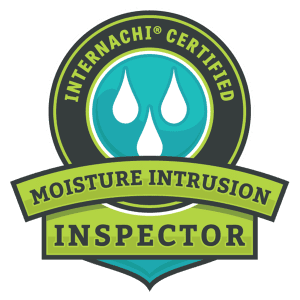
For example, someone seeking coverage for a property that is 30 years old may have electrical or HVAC system issues that could arise within the next few years. Insured homeowners will likely seek reimbursement for such issues, costing insurers more in the long run. Insurance providers utilize the results of this exam to have a clear picture of the financial risk being taken on with the insured property.
New homeowners can also use this as a tool to gauge whether the prospective property is worth the investment before fully committing financially to a mortgage. Noticeable issues found in the four major systems of the home can be telling of future headaches on the horizon.
Even if you’re not located in a state that requires this particular inspection, there are several benefits to having one done:
1. Fast and inexpensive: These inspections are known for being inexpensive and are performed by a trained, licensed professional within a few hours.
2. Guarantee the condition of your real estate: If you’re thinking of selling, this inspection can allow you to see what issues need to be addressed before proceeding.
3. Avoid future headaches: Evade unexpected issues by proactively checking on the condition of the major systems in your home.
What Does A 4-Point Inspection Cover?
When having a 4-point inspection completed on your new forever home, the licensed inspector will examine the following systems:
1. HVAC (heating, ventilation, and air conditioning): Does your home have air conditioning and central heating? If so, what condition are the units in and are there obvious signs of leakage?
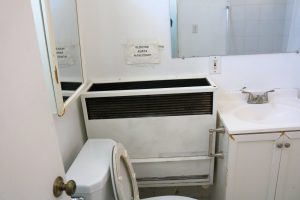
2. Electrical: Do you know the type of wiring running throughout your house? Homes with aluminum, knob-and-tube and copper wiring present increased fire hazard risks and are commonly uninsurable.
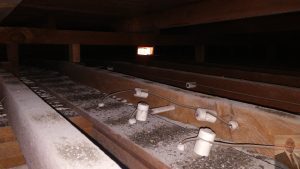
0 61f0 05002d04e03a86804e01040c301ef3cf81db46141d940f61de3f051e349761de43f7
3. Plumbing: Are the pipes in your home made of polybutylene, which is known to cause leakage problems? Inspectors will examine pipes to gauge their likelihood of bursting, which could lead to water damage.
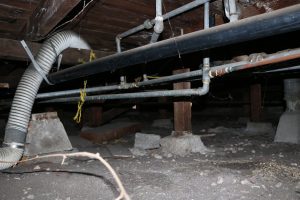
4. Roofing: Is there apparent shingle damage or cracked tiling on your roof? Inspectors will be looking to determine the age, material and life expectancy of the roofing system.
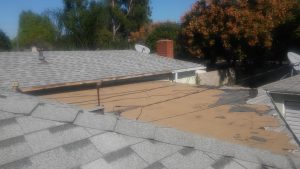
Heating, Ventilation And Air Conditioning (HVAC)
HVAC, which stands for heating, ventilation and air conditioning, can be considered one of the most integral systems, as it regulates the climate control within your home. Improperly installed or outdated HVAC systems elevate the risk of poor air quality and dust accumulation, potentially leading to unwanted health complications if left unchecked.
As the licensed inspector examines the HVAC unit, they will be looking for the following:
Fully Functioning Heating and Cooling Unit
To pass, a homeowner must have an appropriately sized, fully functioning heating and cooling unit installed in their home. It’s important to note that fireplaces, oil furnaces and window AC units are not considered primary heating and cooling units for a home due to safety concerns and energy inefficiency.
Condition And Age of The HVAC System
Although not seen as pass/fail criteria for the inspection, the condition and age of the HVAC unit is reviewed during the inspection. The inspector will be able to get a better idea of the life expectancy of the unit when examining these factors, while also gauging how well-maintained the system is. If there are no apparent system issues, you should be fine.
Note: If an HVAC unit is over 20 years old, you will likely be advised to replace the system for an updated model.
Electrical Wiring and Panels
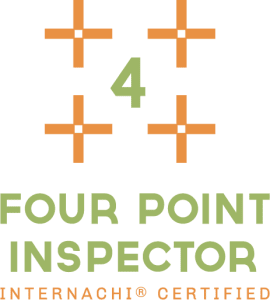
When it comes to the inspection of your electrical system, inspectors will mainly be looking to make sure everything meets code regulations. What does this mean? All electrical outlets should be properly grounded, and the system’s size must be appropriate for the size of the house.
If an inspector discovers an issue with your electrical system, like a code violation, you could still pass the inspection. It is really dependent on the severity of the violation and the potential risk associated with it. However, there are some components of an electrical system that are uninsurable, which will lead to inspection failure. These include:
• Aluminum branch wiring
• Knob-and-tube wiring
• Fuses/fuse boxes
• A double-tapped breaker
• Cloth and sheath wiring
Plumbing Connections and Fixtures
During the inspection of the home’s plumbing system, the licensed inspector will evaluate the material and age of the drain and supply lines throughout the house, looking for signs of leakage. They will also look at the current condition of the water heater, ensuring it effectively distributes water throughout the home.
Roofing
The roof inspection is known for being the most comprehensive portion. The roof design of a home is not only integral to the entire building structure, but it also impacts factors like energy efficiency and mold accumulation. Inspectors look closely for potential health and safety risks that may compromise the structure of the home and the safety of those living within.
The following are factors evaluated during the roofing inspection:
• Age: Roofs have life spans just like every other component of a house. After about 20 years, it is recommended that the roof be replaced. If not, the result will be cracked, curling or missing shingles.
• Signs of deterioration: Poorly designed or older roofs will allow pools of water to form on the surface, leading to water damage. Inspectors will look for apparent signs of roof damage that would compromise the safety of the home.
• Leakage: Inspectors will be sure to check for potential leakage issues. Roof deterioration can lead to leakage in your home, causing even more costly damage.
• Roof shaping: The shape of your roof affects your home’s ability to withstand common weather conditions. Today, hip roofs are most common for protection against high winds and snow.
How Do I Prepare for A 4-Point Inspection?
The licensed professionals performing the inspection examine homes for clear signs of health and safety risks within the four systems mentioned above. Preparing your home means analyzing your house for evident safety issues within those areas that an inspector would be required to note.
Here are a few things to look for before your inspection takes place:
1. The HVAC unit should be functioning properly. You are not allowed to utilize fireplaces, oil furnaces or window AC units as central heating and air conditioning for the Home or Property.
2. Look for any exposed or ungrounded wiring. Double tapped breakers, fuse boxes and aluminum wiring are also red flags. These are apparent fire hazards and will need to be fixed or replaced.
3. Pay attention to signs of leakage, water-damaged walls, and pipe deterioration. Due to the severe damage plumbing issues can cause, these issues alone will disqualify you from receiving homeowners’ insurance.
4. Have a roofing professional come to your home and inspect the condition of your roof. Replace or fix any broken, missing, or warped shingles. Evident signs of water damage or holes will also need to be resolved.
4-Point Inspection Vs. Full Inspection
People often mistake a 4-point inspection for a full home inspection. The two share a common goal of inspecting the current condition of a home, but they do have key differences that you should be aware of before deciding which inspection method is right for your property. Take note of the following differences before moving forward with finding a licensed inspector:
A 4 POINT INSPECTION IS REQUIRE FOR YOUR PROPERTY TO BE INSURED
A CERTIFIED HOME FULL INSPECTION IS NOT
Extent
Having a 4-point inspection performed is generally a quick process since inspectors are only examining the essential systems of the property.
Full inspections are known for being thorough and comprehensive, examining many more aspects of the home than in a typical 4-point inspection. Inspectors will review the following:
• Appliances
• Interior
• Exterior
• Drainage and grading
• Doors and windows
• Plumbing
• Electrical systems
• Roofing
Purpose Of Inspection
Potential homeowners and insurance companies generally look at 4-point inspections when dealing with homes over 20 years old, where structural integrity and other safety issues can arise.
Usually performed when people are prospecting a potential home, full home inspections are more comprehensive. A holistic look at the condition of the home is sought after to guarantee its value and condition.
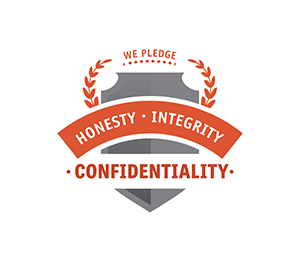
Everyone else is just looking around
Insurance Requirements
Insurance companies will often require homeowners with property over 20 years old to get a 4-point inspection to receive coverage or renew an existing policy. As homes get older, the likelihood of potential issues increases significantly, and providers want to ensure the real estate they’re liable for won’t cost them a fortune to cover.
Generally, full inspections are performed during the home buying process to see if the property is in good condition. They’re not usually a requirement, but more seen as due diligence. Before purchasing a home, you’ll want to make sure that all aspects of the home are functioning properly, which can be confirmed with a full inspection. From there, you’ll have a better idea if this should be your next home or not.
Book A Home Inspection
If you'd like to book an inspection, or request more information from us on pricing and our services, please submit this form.